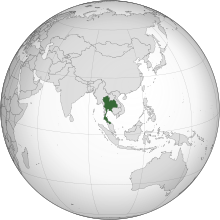LGBT rights in Thailand
|
LGBT rights in Thailand |
|
|---|---|

|
|
| Same-sex sexual activity legal? | Legal since 1956. Age of consent equalized to 15 in 1997. |
| Gender identity/expression | Yes |
| Military service | Yes, since 2005 |
| Discrimination protections | Yes, since 2015 |
| Family rights | |
| Recognition of relationships |
No |
Lesbian, gay, bisexual, and transgender (LGBT) people in Thailand may face legal challenges not experienced by non-LGBT residents. Both male and female same-sex sexual activity are legal in Thailand, but same-sex couples and households headed by same-sex couples are not eligible for the same legal protections available to opposite-sex couples.
In 2013, The Bangkok Post said that "while Thailand is viewed as a tourist haven for same-sex couples, the reality for locals is that the law, and often public sentiment, is not so liberal." The largest organization campaigning for same-sex marriage is Anjaree. A 2014 report by US Agency for International Development—and the United Nations Development Programme said that LGBT people "still face discrimination affecting their social rights and job opportunities", and "face difficulty gaining acceptance for non-traditional sexuality, even though the tourism authority has been promoting Thailand as a gay-friendly country".
Private, adult, consensual and non-commercial sodomy was decriminalized in Thailand in 1956. The age of consent was set at fifteen years. However, same-sex attraction and transgenderism were seen as signs of mental illness or defect.
Changes in attitudes and public policy towards LGBT issues began to occur in Thailand during the 1990s and, in particular, the early part of the twenty-first century. In 2002, the Ministry of Health announced that homosexuality would no longer be regarded as a mental illness or disorder. In 2005, the Thai armed forces lifted the ban on LGBT people serving in the military. Prior to this reform, LGBT people were exempted as suffering from a "mental disorder", according to a law of 1954.
In 2007, the Thai government expanded the definition of a sexual assault or rape victim to include both women and men. The government also prohibited marital rape, with the law stipulating that women or men can be victims.
...
Wikipedia
